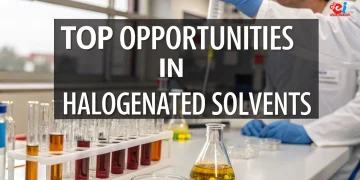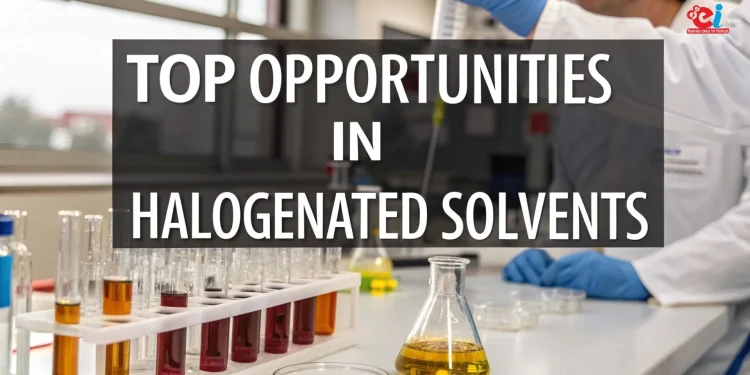Why Halogenated Solvents Deserve Your Attention
The industrial chemicals sector is changing dramatically because of new patterns of globalization, increased downstream industries like pharmaceuticals, agrochemicals, polymers and electronics, and tighter environmental regulations. One type of chemical that continues to retain importance throughout these sectors are halogenated solvents.
These solvents are particularly important for the precision cleaning of manufactured parts because they provide unparalleled solvency power and volatility. Halogenated solvents are used broadly in extraction processes, polymer synthesis, degreasing functions, and as reaction media in high-value pharma and agrochemical production.
In India, with the rapid growth of pharmaceutical, agrochemical and specialty chemical industries comes a concomitant rise in demand for halogenated solvents. This presents MSMEs with an entrance strategy into a niche, high-margin market characterized by robust downstream demand and increasing localization prospects.
In this article we will examine the halogenated solvents market more closely — looking at its demand drivers as well as manufacturing processes, regulatory considerations, and most importantly how MSMEs can set up solvent manufacturing units by obtaining technical support through guidance documents and feasibility studies.
Characteristics and Importance of Halogenated Solvents
Halogenated solvents belong to the category of volatile organic compounds (VOCs) and include solvents all the more harmful than traditional hydrocarbons due to added halogens such as Cl, F, or Br Methane. The chemical processes that these undergo due to their structural chains allow them to be used more efficiently.
Some common types are:
- Dichloromethane – used for methylene chlorides in painting industries, pharmaceuticals, and even adhesives
- Chloroform – used as a solvent in various synthetic reactions performed chemically
- Carbon tetrachloride
- 1,2-Dichloroethane – vital intermediary for the synthesis of polyvinyl chloride
- Trichloroethylene and perchloroethylene – used widely in services involving deep cleansing of machinery parts
Almost all of them are still being halogenated because they remain essential within many industrial processes. Certain pharmaceutical companies still use closed-loop systems or high-purity techniques within this API synthesis when extracting halogens due to its unmonitored supervision on restricting toxic solvents worldwide.
Related: How Chemical Manufacturing is Adapting to Sustainable Chemical Manufacturing Practices
The Opportunity for MSMEs in India’s Demand Halogenated Solvents Market
India is expected to become the world leader in API manufacturing, which has created a surge in the demand for high-performance reaction media such as methylene chloride and chloroform. The country’s specialized chemical industry along with its growing pharmaceutical sector has proven to be a powerful demand engine for halogenated solvents.
As per research, the Indian market for halogenated solvents is projected to expand from 2024 to 2030 at a compound annual growth rate (CAGR) of over 6%, owing to:
- Expansions in APIs and agrochemicals synthesis that are supportive of high-purity solvents increase
- Growth opportunities within the textile, polymer, and electronics industries as end-users replace low-quality generic solvents with more efficient halogenated options
Furthermore, there is still a marked gap between what India imports and exports regarding highly purified Halogenated Solvents sourced from China and Europe. This dependence on trade presents an opportunity towards local fulfillment centers to service unaddressed domestic needs while filling gaps for backward integration pipelines within the pharmaceutical and agrochemical supply chains.
A Deep Dive into Technology and Inputs for Manufacturing Processes
Although halogenated solvents might sound sophisticated, the techniques used to produce them are straightforward and well understood. These production facilities do need to be very carefully engineered because of the presence of halogens as well as volatile intermediates requiring strict environmental controls and safety measures.
Example: Methylene Chloride Production
Methylene chloride is usually produced via chlorination of methane.
Chlorination Reaction:
Methane gas is reacted with chlorine gas in the presence of a catalyst (typically, iron) along with heat. This reaction shifts equilibrium through the free radical mechanism and produces a mixture containing methyl chloride, methylene chloride, chloroform, along with carbon tetrachloride – this complex mixture is called chlorinated methanes.
Fractional Distillation:
The mixture resulting from the above-mentioned reaction is separated in several stages utilizing distillation in order to improve separation between all chlorinated by-products and purify methylene chloride.
Further steps aim to completely remove contaminants until only pure residue remains which can be classified as pharmaceutical grade or electronics level.
Storage Operating Procedures And Documentation Instructions – S.O.P.D(I):
Such high-purity products must be retained inside high-technology non-corrosive reservoirs to guarantee no corrosion occurs while still controlling emissions as well as exposing workers during transfers using sealed pathways.
Other halogenated solvents undergo the same processes — hydrocarbon halogenation followed by distillation and purification. MSMEs entering this industry must invest in precision control systems, closed-loop recycling systems, testing labs, and quality verification labs to meet product specifications while honoring environmental norms.
Related: Start a Bulk Solvent Business in India: High-Demand, High-Profit
Cost Considerations for MSMEs
Capital investment is moderate to high for establishing a plant that produces halogenated solvents, however it is significantly lower than bulk petrochemical plants. With an investment ranging from ₹20 to ₹35 crores, a small to medium-scale facility with an annual production of 3,000 to 5,000 tonnes can be set up depending on the automation level and product mix.
Generalized Cost Outline:
- Land and Civil Construction: ₹3–4 crores (industrial zoned land)
- Plant Machinery & Equipment: ₹10–14 crores (reactors, distillation columns, condensers, scrubbers, storage tanks)
- Environmental & Safety Compliance Setup: ₹2–3 crores (ETP, emissions control, fire safety, PPE)
- Raw Materials and Utilities: ₹2–3 crores (chlorine, methane, water, electricity)
- Project Development & Licensing: ₹1–2 crores (consultants, patents, design, testing labs)
Investment and profits go hand in hand as always. With an investment in this sector, profit margins become available at around 20–30%, which makes the long-term gain much more enticing. Further on, MSMEs can combat market risk by indulging in contract manufacturing with larger chemical or pharma companies through a lease-based model structured during early stages.
Regulatory and Environmental Compliance
From an overall perspective these factors are critical when it comes to any segment within Halogenated Solvents Lean Manufacturing. It deals with hazardous chemicals so already under tight control from governance — working along legal frameworks creates both lack of options as well as positive opportunities entrepreneurs face bold challenges.
Important Permits Include:
- Environmental Clearance from MoEFCC
- Consent to Establish and Operate from SPCB
- Hazardous Waste Handling Registration
- Occupational Health & Safety Certifications
- Explosive and Gas Storage Licenses (if chlorine is used onsite)
Technological advancements as well as closed-loop systems have made solvent emission control far more efficient than before. With modern scrubbers, condensers, and solvent recovery units, plants are able to meet global emissions standards while remaining profitable.
Value-Added Opportunities for MSMEs
The reason why MSMEs can profit from halogenated solvents is the opportunities present for value addition along with backward or forward integration.
- An MSME could venture into the market producing methylene chloride and later expand into high-purity variants for electronic or pharma clients.
- Another option would be establishing custom synthesis or toll manufacturing where multinationals outsource solvent production to Indian manufacturers that can provide them at a cheaper rate.
- MSMEs can work on developing downstream integrations like blends of solvents and formulating cleaning products or fine chemicals that use halogenated solvents as precursors.
- Another interesting movement is the recovery and recycling of solvents, where used halogenated solvents from certain industries are collected and treated for reuse. This approach to business earns sustainability credits while also reducing the need for new materials.
How NPCS Supports Solvent Entrepreneurs
Starting a chemical manufacturing business—especially one involving halogenated compounds—requires more than just capital and courage. It demands deep technical insight, cost modeling, risk assessment, and regulatory guidance. That’s where Niir Project Consultancy Services (NPCS) steps in.
NPCS provides comprehensive Market Survey cum Detailed Techno-Economic Feasibility Reports (TEFRs) tailored for entrepreneurs entering the specialty chemicals space. These reports cover everything from manufacturing processes and raw material sourcing to plant layout, environmental compliance, machinery vendors, and detailed financial projections.
Entrepreneurs rely on NPCS not just for feasibility assessment, but also for:
- Vendor selection and sourcing strategies
- Technology licensing and layout design
- Financial modeling and ROI forecasting
- Navigating complex environmental and safety clearances
With NPCS as your strategic knowledge partner, launching a halogenated solvent unit becomes a guided and data-driven venture.
Conclusion: Time to Take the Leap into Solvents
The halogenated solvents sector is a dynamic and high-potential market for MSMEs in India. As downstream industries such as pharmaceuticals, agrochemicals, and electronics grow rapidly, demand for high-performance solvents will continue to rise. For entrepreneurs with a strong operational mindset and a willingness to adopt best-in-class safety and compliance systems, this segment offers strong returns, diversification, and long-term growth.
As India continues to localize its specialty chemical supply chains, halogenated solvent manufacturing presents a once-in-a-decade opportunity to build a sustainable and globally competitive business. The path requires planning, precision, and policy alignment—but the rewards are more than worth it.
Ready to Enter the Solvent Business?
Explore NPCS’ full range of feasibility reports on solvent manufacturing, API intermediates, and industrial chemicals.


















